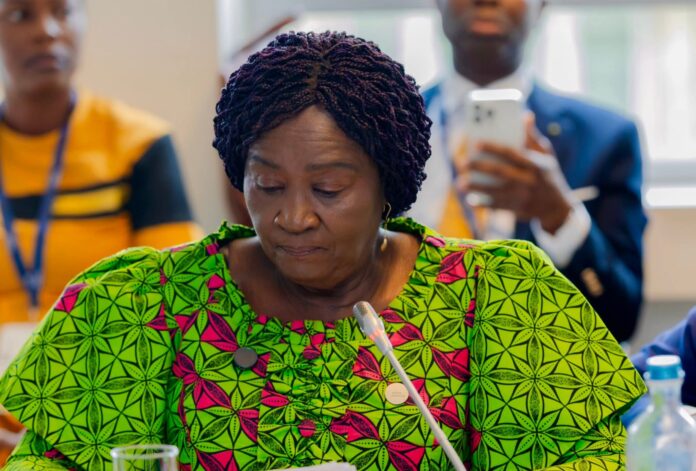Vice President Professor Naana Jane Opoku-Agyemang has reaffirmed Ghana’s commitment to maintaining its position as a global leader in high-quality cocoa production, while also championing fairness for its more than 800,000 farmers.
Speaking on the second day of the Global Gateway Forum in Brussels, at the Sustainable Cocoa Initiative Scale-up Session, the Vice President stressed that ongoing reforms at the Ghana Cocoa Board (Cocobod) are designed to strengthen investor confidence and ensure equitable returns for farmers’ labour.
Also Read: Mahama arrives in Beijing for state visit and global leaders’ meeting on women
“Ghana’s cocoa grading and quality control systems remain among the most rigorous in the world,” Prof. Opoku-Agyemang stated, as she addressed critical issues of pricing, value addition, and enhancing farmers’ livelihoods.
Reflecting on Ghana’s rich history—from Tetteh Quarshie’s first cocoa beans to the present day—the Vice President emphasised that sustainability must be intrinsically linked with fairness.
She cautioned the global community against complacency, noting that with strong global demand and rising African consumption, “The greater risk lies not in overcapacity, but in underinvestment and failing to capture the growing value of the market.”1
Prof. Opoku-Agyemang also targeted the issue of tariff escalation, where duties on processed cocoa products are higher than those on raw beans.2 She argued this practice severely limits the ability of producing nations to trade fairly and retain more value.
The Vice President underscored cocoa’s pivotal role in Ghana’s broader economic transformation agenda. This focus aligns directly with the government’s Big Push Initiative for Agro-Industrialisation and the Connect24 pillar of the 24-Hour Economy, which aims to boost the flow of goods, energy, and data.
Highlighting a major success, she cited the Living Income Differential (LID), introduced jointly with Côte d’Ivoire, as a concrete reflection of Ghana’s dedication to ensuring farmers receive a fair return.3 Furthermore, she described the African Continental Free Trade Area (AfCFTA) as a powerful vehicle for building regional value chains and keeping wealth within the continent.
However, the Vice President pointed to financing as a significant hurdle. She observed that investments are often concentrated in multinational or state-owned facilities, leaving local processors to struggle with high borrowing costs and limited access to essential capital.4
In a direct call to action, Prof. Opoku-Agyemang advocated for structured blended financing models. These models, she suggested, should combine long-term capital investment with affordable working capital, alongside robust risk-sharing mechanisms and technical support, especially for small and rural processors. She positioned both the EU Sustainable Cocoa Initiative and the Global Gateway Framework as ideal facilitators for such partnerships.
Concluding her remarks, the Vice President stressed that the recent global surge in cocoa prices—driven by supply shortfalls—amplifies the urgent need for coordinated action to build a resilient cocoa industry.
“Our path forward is clear,” she declared. “We must move beyond exporting raw cocoa beans to building an economy that empowers farmers, creates decent jobs, and promotes sustainability.”5
She affirmed that Ghana remains open to partnerships that link advances in disease and pest control with the development of commercial plantations to ensure quality and predictability, concluding, “Together, we can build a cocoa sector that not only sweetens the world’s palate but also enriches the lives of the farmers and communities who make it possible.”


